- One hundred and sixty people have taken the programme since its creation in 2016
- UniversiMés Plus has taken another step towards the inclusivity of the University, with the incorporation of people with intellectual disabilities in undergraduate classrooms
In October 2016, twenty people with intellectual disabilities sat in a UManresa classroom to participate in UniversiMés, a programme specifically designed to offer them the opportunity to have a university experience. They began a journey of two academic years, during which they would receive training on current affairs, economics and business, art and culture, and health, with the focus on expanding their range of socio-cultural interests. Unlike other university programmes that are basically focused on training and job opportunities, UniversiMés centred on providing tools and resources for the personal growth and civic and cultural participation of its students. This approach is what made it and still makes it unique and pioneering in Spain.
Since then, seven class groups have started and completed this training course, and another class group will graduate at the end of this year. The programme was only interrupted during the pandemic, in the 2020-2021 academic year, due to the difficulties of teaching face-to-face with a particularly vulnerable group. In total, one hundred and sixty people have taken the programme over these years.
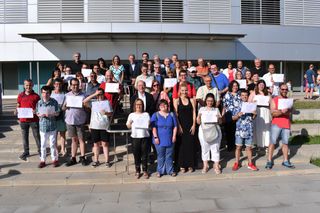
The result of mutual understanding and collaboration
The creation of a programme designed specifically for people with intellectual disabilities at the Manresa Campus was the idea of Carlota Riera, who is currently director of Corporate Development at the Bages-UManresa University Foundation, and Àngels Fusté, who is currently in charge of the Accessible and Inclusive University programme, of which UniversiMés forms part. From the outset, both of them were clear that this initiative could only be carried out with the AMPANS Foundation, which received the initial project with great enthusiasm. Cristina Llohis, director of AMPANS Day Care Services and coordinator of the UniversiMés programme, recalls that they received the proposal with great interest because "professionals from the social and academic fields working together was a unique opportunity to combine knowledge and expertise and to compare methodologies and professional practices. In addition, the programme brings the university closer to people with disabilities so that they can learn in a new environment. We considered it a great opportunity for people with disabilities and for University students, as they could share classrooms and spaces and learn together. Everybody benefitted. The good understanding between AMPANS and UManresa, entities that share the same values and culture, became an excellent basis for building UniversiMés.”
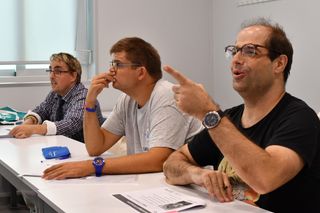
Carlota Riera agrees with Llohis that “UniversiMés emerged in a way that very well defines UManresa and AMPANS: with the aim of working for a better world, with an idealistic approach in which everything is possible, and with a way of working together to turn ideas into facts. The first year was almost an experiment in which we all learnt a lot. And I understood how important what had been started was when, at the end of the course, a student’s mother said to me: ‘When she was little, my daughter asked me if she would ever go to university. Through tears, I told her that it would not be possible. I have never taken so much joy and pride in being wrong. Infinite thanks. My daughter, in the end, was right.’ “I cried then and I still cry today when I remember this,” she added.
The support of BBVA and the Fundació Antigues Caixes Catalanes (FACC) was also essential from the outset, and made it possible to ensure the accessibility of the programme in economic terms. Due to grants that cover 100% of the tuition costs, the training is completely free for the students. José Ballester, regional director of BBVA Catalunya, explained that "seeing these students’ enthusiasm for participating in this programme demonstrates that we need to continue making efforts to create learning opportunities for all. This is a living programme, which evolves and reinvents itself to provide students with incentives that help them have a fuller social and cultural life.” BBVA’s involvement has always gone beyond a financial contribution. They have actively participated in activities, especially in the economy modules and those of arts and culture.
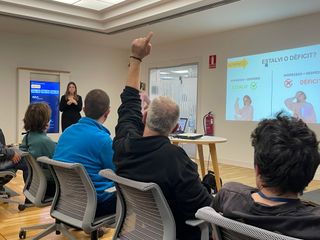
The Antigues Caixes Catalanes Foundation (FACC) joined this project, with the support of the BBVA, because of its educational and inclusive nature. Jaume Ribera, president of the FACC, noted that UniversiMés had come about due to "the shared interest of four entities from various fields that, together, contributing knowledge and resources, make it possible for people with intellectual disabilities to enter university. Moving towards greater inclusion is a responsibility felt by all parties involved in the project.” He appreciates the programme's effort to encourage students to “take a critical look at current affairs and the immediate environment, beyond the workplace, and thus strengthen their role as citizens.”
UniversiMés Plus, another step in inclusivity
The programme has evolved over the course of eight years. New content has been introduced, new teaching staff have joined, and new challenges have been set for the students. Last academic year, 2023-2024, the programme took a further step, with the launch of UniversiMés Plus. Àngels Fusté explained that “this is an initiative that not only makes the university more accessible to people with intellectual disabilities, but also, above all, allows us to deepen the capacity to include diversity in the classrooms.”
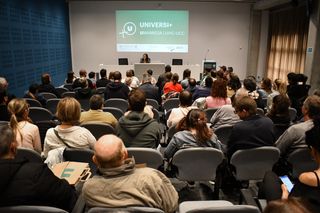
UniversiMés Plus offers a small group of people with intellectual disabilities (between three and six each year) the opportunity to join a work group of undergraduate students to prepare a project during an academic year. The initial commitment is for one academic year, which can be extended if the student and teacher consider it appropriate. Participants must have completed the UniversiMés initial programme with a good level of attendance and motivation and they must be available to come to the university weekly for an entire academic year. As in the initial programme, the students are supported by a teacher, Montse Barat, an AMPANS specialist, who accompanies them in their learning process. She also helps teaching staff with aspects such as easy reading, accessibility and Universal Design for Learning.
The first edition was a pilot test. Three former students of the UniversiMés programme took part. They joined work groups of students from the bachelor’s degree in Early Childhood Education Teaching at UManresa. This first experience benefitted both undergraduate and UniversiMés students. The undergraduate students found that having a UniversiMés student in the work group incorporated different perspectives and views, which improved the understanding of the phenomena studied. In turn, this translated into better results, which were highly rated by tutors. UniversiMés students appreciated the opportunity to deepen their university experience. Francesc Padró, a UniversiMés Plus student, rates very highly the sense of contributing, from his own experience and knowledge, which he experienced in this initiative. He explained: “I've done things I never thought I could do, I’ve discovered new interests and it’s encouraged me to take on new challenges.”
Gabriel Lemkow, who is responsible for the academic activity of the bachelor’s degree in Early Childhood Education Teaching, in which students with intellectual disabilities were included, considers that the experience was excellent: "They participated as additional members of the groups and made key contributions to the projects. The students of our degree were very positively surprised by their proactivity, their involvement and the strength of their contributions.” However, he believes that there is room to improve the experience and make it even more beneficial. "UniversiMés students’ access to digital tools could be improved so that they can work under the same conditions as undergraduate students, also we should identify visible and invisible barriers that we don't pay attention to because they simply don't affect us as people who have conditions or privileges that others do not have,” he said. With a view to the new edition, which has just been launched, Lemkow explains that “gradually, we try to incorporate aspects such as easy reading, accessibility or Universal Design for Learning (UDA), but it is clear that we have to make more effort to do this even better and above all to listen to UniversiMés students to respond to their needs.”
Transform the University
Since its inception, one of the factors that has driven the UniversiMés programme has been the desire to offer a university experience that is as similar as possible to that of the rest of the University's students. Consequently, although the content is adapted to facilitate understanding, the teaching staff are made up entirely of university lecturers. Jordi Conca, lecturer on the degree in Business Administration and Management (ADE), explains that “being a teacher on the UniversiMés program is a gift, it is a very enriching experience. I have been able to watch the students grow in confidence and skills, and it has helped me to eliminate stereotypes about disability. I don't just teach, I also learn from the students, who bring a unique and necessary view on learning, coexistence and their spirit of overcoming.”
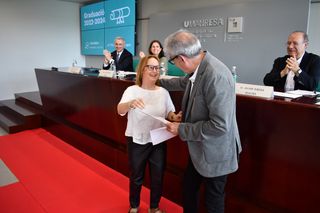
In addition to increasing the accessibility of the University, UniversiMés has sparked a transformation of the Manresa Campus, making it a richer environment because it is more diverse. Gabriel Lemkow, lecturer on the bachelor’s degree in Early Childhood Education Teaching, believes that the programme has made the University better "because it offers opportunities for mutual understanding between bachelor’s degree students and people with whom they might otherwise not interact (or work); because it helps to dismantle stereotypes and prejudices in relation to people with some type of disability, and normalizes the fact that formal education spaces are spaces for everyone". In the same vein, Professor Jordi Conca added that “the programme has enriched the university community, and forced the teachers who participate to incorporate new ideas and training proposals. Students with intellectual disabilities or other abilities not only learn academic content, but also bring their perspectives and diversity to the University.”
Students who work
The students of the UniversiMés programme are of varying age and origin. Initially, most came from Manresa and El Bages, but from the third year candidates began to arrive from other geographical areas, especially after contact had been made with other disability care entities. At the moment, the programme has students from Osona, Anoia, Berguedà and Vallès Occidental, in addition to Bages. Like their undergraduate classmates, they carpool or take the bus to get to university.
A characteristic that most UniversiMés students share is the fact that they combine studies and work. In fact, being in work is a criterion in the selection process for one of the twenty places that the programme offers each year. It reinforces the idea of a training course that is designed not for job opportunities, but to expand knowledge for the joy of learning and gaining tools to better understand today's world with a critical approach. Other criteria used in the selection process are having a functional level of literacy and numeracy, having the ability to understand and express yourself orally, having an officially recognized degree of disability of less than 65%, and obtaining a referral from an organization that cares for people with disabilities.
A programme that grows and evolves
UniversiMés is an evolving programme. Its evolution is linked to the demands of the students and to the University's resolute commitment to inclusivity. According to Cristina Llohis, some of the programme’s future challenges are "incorporating training activities that are focused on making knowledge more accessible, adopting the Universal Design for Learning methodology, following the lifelong learning model, promoting greater inclusion in university life and normalizing the presence of students with diversity.”
Some of these changes have already materialized in recent years. Until last year, UniversiMés offered one hundred hours of training, spread over two academic years, in a university environment. However, at the end of this period, no strategy was foreseen to maintain the students’ connection with the University. With UniversiMés Plus, last year, some former students were able to reconnect with the University, but this was only a small group.
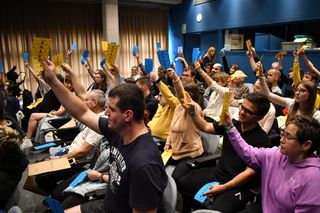
Nevertheless, there were many who expressed their desire to continue the experience started with UniversiMés. To respond to this interest, this 2024-2025 academic year, UniversiMés FC has been launched, which offers continuing education courses open to all former students. “It's another step in the desire to bring the university experience of UniversiMés students closer to that of other students,” explained Àngels Fusté. She added: “With this new proposal, they know that they can always return to the University and that they will find a space for personal growth, a place to learn from and with other people. This should be a right for everyone and, with UniversiMés, we are making it available, gradually, to an increasing number of people.”